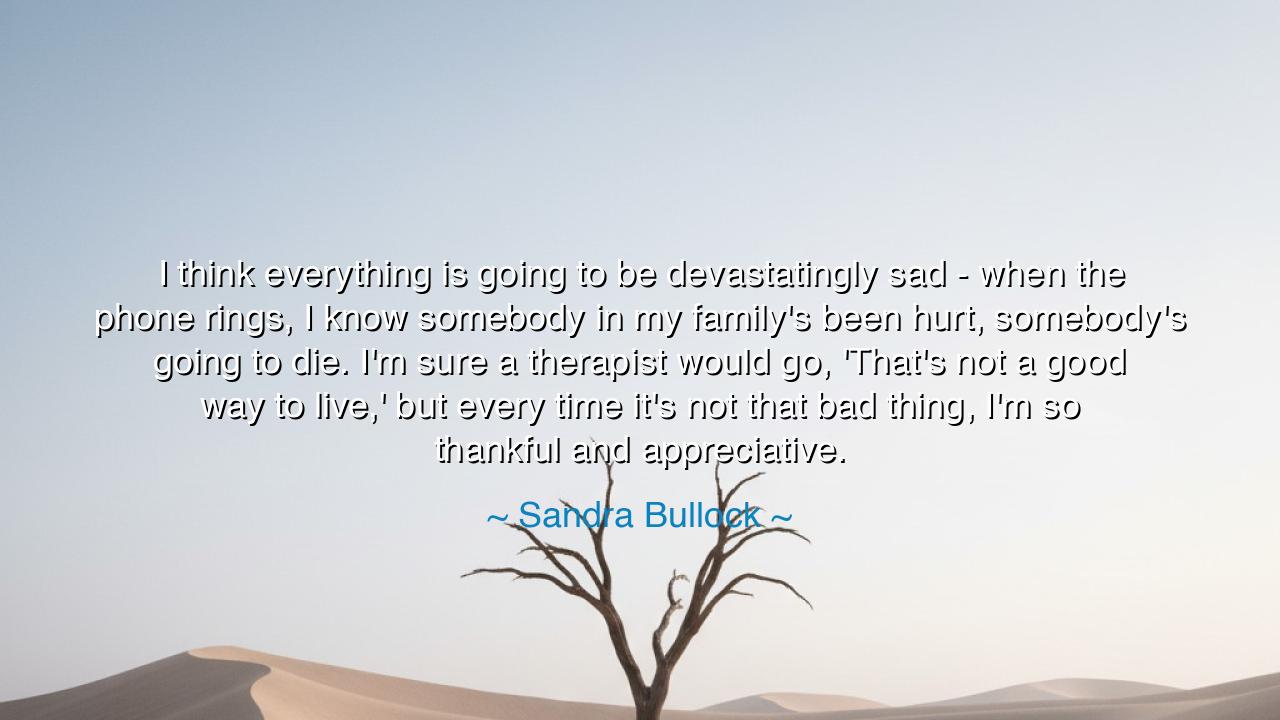
I think everything is going to be devastatingly sad - when the
I think everything is going to be devastatingly sad - when the phone rings, I know somebody in my family's been hurt, somebody's going to die. I'm sure a therapist would go, 'That's not a good way to live,' but every time it's not that bad thing, I'm so thankful and appreciative.






Sandra Bullock speaks with the tremor of a soul that has seen both joy and sorrow, saying: “I think everything is going to be devastatingly sad—when the phone rings, I know somebody in my family’s been hurt, somebody’s going to die.” In these words lies the shadow of fear, the haunting thought that calamity waits behind every sound, every call, every sudden stirring of life. Yet her confession does not end in despair. For she also says that when the dreaded thing does not happen, she feels thankful and appreciative. Thus, her wisdom is paradoxical: fear shapes her, but gratitude redeems her.
This way of thinking is not foreign to the ancients. It echoes the teachings of the Stoics, who prepared their hearts for the possibility of loss so that when loss did not come, they might be filled with joy instead of crushed by surprise. To live with the awareness that sorrow is near is not cowardice—it is vigilance. The poet Horace once wrote: “Pale death with impartial foot knocks at the huts of the poor and the towers of kings.” Sandra’s words remind us that even in modern days, the soul still trembles before this eternal truth. Yet in her trembling, she finds the strength to lift her eyes and give thanks for every moment untouched by disaster.
Consider the tale of Epictetus, born a slave, who walked through life expecting hardship at every turn. He trained his heart so that when calamity came, it found him ready, and when calamity passed him by, he celebrated the gift of ordinary peace. Bullock’s words reflect the same discipline, though born not from philosophy but from lived experience—the instinct of one who knows the fragility of life and clings fiercely to gratitude when harm has not arrived. It is not the absence of fear that strengthens her, but the transformation of fear into appreciation.
Her declaration that “a therapist would go, ‘That’s not a good way to live’” reveals a tension. The modern mind seeks freedom from anxiety, but the ancient soul understood that awareness of mortality can sharpen joy. To know that a loved one may vanish tomorrow makes today sacred. To suspect that the next ring of the bell might bring grief makes the silence between rings a sanctuary of blessing. Thus, fear and gratitude walk hand in hand, and the heart grows wise enough to see beauty even in its trembling.
But let us not glorify fear without caution. For Bullock’s way of seeing is both a burden and a gift. If fear becomes a master, it steals peace; if fear becomes a servant, it sharpens thanksgiving. The balance lies in refusing to let dread dominate, while still letting mortality remind us of the preciousness of the present. This is the heroic struggle of the human heart—to stand between despair and gratitude and to choose the latter, even with trembling hands.
The lesson here is clear: do not wait for calamity to remember your blessings. When the phone rings and it is not the bearer of sorrow, pause to breathe, to whisper thanks, to rejoice in the continuation of love and life. This is a practice of the soul, a discipline of gratitude, where even fear is transmuted into reverence for the fragile gift of time.
Practical actions follow easily: each day, before sleep, name aloud the mercies that came to you—the laughter of a friend, the safety of your family, the ordinary peace of breath and bread. When fear arises, let it serve as a reminder to be present, to hold your loved ones closer, to speak words of kindness you might have left unsaid. Thus, fear becomes not a chain but a fire that burns away indifference, leaving the heart tender and awake.
So let Bullock’s words be carved into memory: to fear the loss of love is the mark of one who loves deeply. But to let that fear birth gratitude is the mark of one who lives wisely. May we too live with such wisdom, embracing both the trembling and the thanksgiving, until our days are spent as offerings of love, gratitude, and presence.






AAdministratorAdministrator
Welcome, honored guests. Please leave a comment, we will respond soon